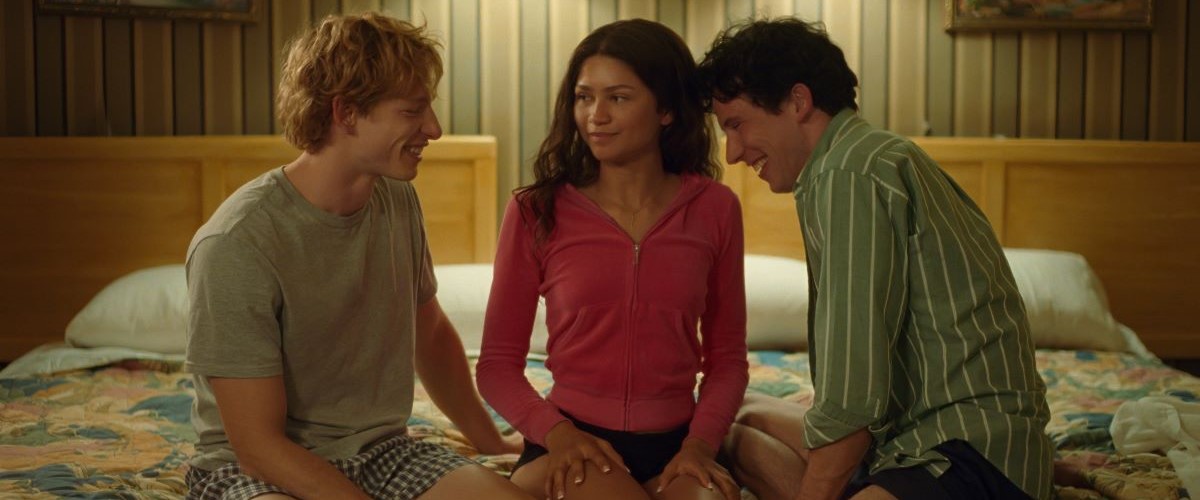
Love is a very important word in tennis. In scoring, curiously enough, it means zero. There is also the love of the game which keeps lower ranked players grinding away on the challengers’ circuit, staying at seedy motels, eating crappy food, hoping for that one big break. There is the love we see between doubles players, who traverse the court in perfect harmony, each subconsciously anticipating the other’s next move. There is also, says Zendaya, as tennis phenom Tashi Duncan in Luca Guadagnino’s Challengers, a love between opponents. Sometimes you get into a kind of groove, a kind of physical dance and synchronicity that is itself a form of love. This happens rarely, Tashi says, but when it does it’s magical.
Challengers is about a love triangle, albeit an unconventional one. Best friends and tennis players Art Donaldson (Mike Faist) and Patrick Zweig (Josh O’Connor) are both in love with Tashi—but they’re also secretly in love with each other. We see it early in the film when they’re playing doubles—gliding around the court, chest bumping, and getting high off just being together. Director Guadagnino (Call Me By Your Name), that master sensualist, films them in sync—both lanky and loose-limbed, slinging their giant tennis bags over their shoulders in unity.
When they meet Tashi, they’re playing in the junior’s circuit, still merely dreaming of future success. Patrick is going to try his hand as a pro, and both Art and Tashi are going to Stanford, but with one big difference. She’s already a can’t miss star, with an Adidas contract and posters with her likeness plastered all over tournament grounds. In fact, all three meet at a party that Adidas is throwing for her. The boys are in awe of her—her otherworldly poise, beauty, and tennis acumen.
They invite her back to their no-frills hotel room, not expecting her to show up, but she does. As she waits by the door, she hears them frantically straightening the blankets, pulling on shirts, and shoving underwear under the bed. She’s amused and is already aware of the power she has over them.
“I don’t want to be a home wrecker,” she demures, when Art and Patrick admit they both like her.
“It’s not like that,” they both protest . . . a bit too much.
After drinking and smoking and flirting, Tashi pats the bed next to her. In one of the more comical scenes—you’ve probably seen it in the trailer—the boys trip all over each other to sit beside her on the bed. They begin kissing, but she keeps positioning herself so that, in order to kiss her, they must kiss each other. Eventually she pulls away and the boys are making out. The look on her face is, “My work here is done.”
But Challengers is not quite a gay love story, at least not explicitly. Both boys are still after Tashi. Patrick gets her first. It’s clear she’s more attracted to his bad-boy swagger. (Art is the proverbial nice boy.) Art is jealous but accepts his defeat. But he and Tashi get closer in college and he’s by her side when she suffers a catastrophic injury. Realizing her playing days are over—there’s a beautiful scene where Tashi is sitting under a tree and Guadagnino trains the camera on her pained face as she acknowledges the harsh reality—she agrees to coach Art. She says he’s better than Patrick, he just doesn’t know it.
Challengers jumps around several timelines, mostly related to big matches. We know early in the film that Art and Tashi have gotten married and have a daughter and that he has become a multiple Grand Slam champion. Patrick is still languishing in those challenger tournaments, scraping by.
The film makes it clear that what Patrick needed was, well, Tashi. She has transposed her own ambition onto Art, giving him the competitive edge to make him great. But Art is not as enthused about tennis as he once was and is considering retirement. He worries that Tashi will love him less if he’s not a player—and he’s right. Hunger for competition is what fuels Tashi. She sees it in Patrick, but less so in Art, who is basically a dutiful and devoted husband. He became great because she wanted him to be great.
Guadagnino films the tennis scenes like they’re boxing matches—often in slo-mo, with extreme close-ups of flying sweat, straining biceps, and leaping legs. Sometimes he even films from the perspective of the whizzing tennis ball. I’ve never seen tennis filmed more beautifully or effectively.
The soundtrack by Trent Reznor and Atticus Ross is another standout. It’s mostly fast-paced electronica, which disrupts and propels the action at unexpected moments. It has a freneticism with fuels the film.
The three leads are in every single frame and they’re all quite good, with Zendaya being a standout. She has that rare beauty and presence, a la Elizabeth Taylor and Angelina Jolie, where we can believe men would makes fools of themselves, sever longtime friendships, and basically move mountains for her. She has one of the great femme fatale lines ever in this film when Art protests that Patrick doesn’t love her.
“What makes you think I want someone to be in love with me,” she says with a steely-eyed glare.
Faist, who was so good as Riff in West Side Story (you haven’t seen West Side Story yet? Fix that!) is solid here, mixing his yearning with a tiny bit of resentment. Deep down, he knows that even though he got the girl, the connection between Patrick and Tashi is stronger. O’Connor does rascally bad boy quite expertly. All three are convincing on the tennis court.
My sense with Challengers is that Guadagnino wanted to make a tennis film because he knew he could capture the beauty and physicality of the sport better than anyone else. Mission accomplished. He’s also pretty good at that love story thing.
